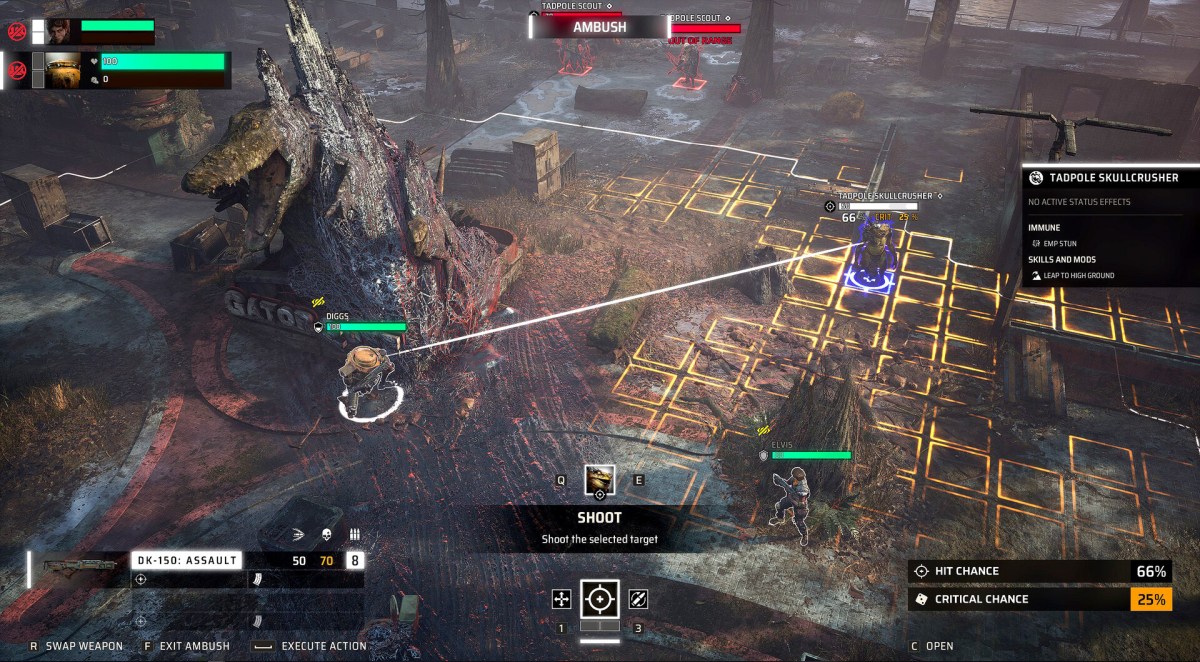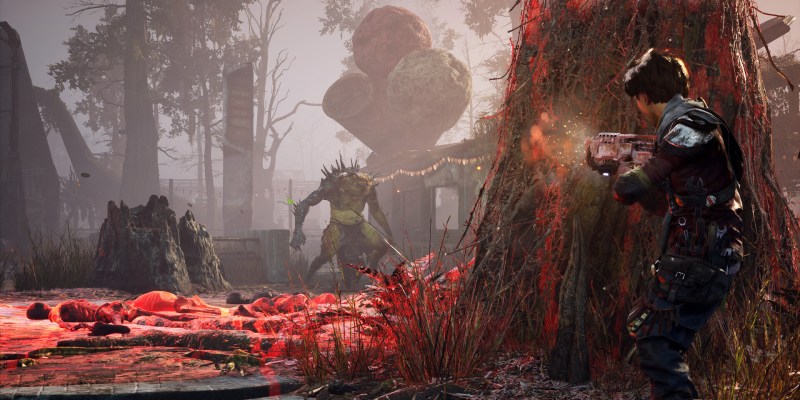Point blank. It may as well have been an execution. With Diggs down, that left the pitched battle as 2 vs. 2. Long odds when my Elvis and Jade were both hurting while the Theever Blaster and Longshot were both near full health. In the upper floor of a ruined building, Jade slipped into full cover, then took a potshot at the Blaster. He didn’t drop. Their turn.
On the other side of the field the Longshot slipped in, no doubt looking for a better vantage point from which he could cap Elvis. His shot went wide. Meanwhile, the Blaster closed on Jade — out from behind the burnt-out car to shimmy up some dangling vines. He stopped right beside her, and I tensed. He didn’t shoot though; getting into position had cost both of his AP. It was the worst kind of reprieve. Jade had to reload on her next turn, and armed with only a sniper rifle, the chance of nailing a point-blank shot was only 50%. But trying to run meant certain death. Elvis had an even lower chance to hit the Longshot and not enough firepower for a kill even if he succeeded.
Stressful? Sure, but it’s these kinds of impossible odds that make me love tactics games. To snatch success from the jaws of defeat is about more than just running the numbers. It’s about taking chances and, even more than that, understanding the interplay of systems. Miasma Chronicles is no exception, and when those Hail Mary plays go just right, there’s not much else in gaming that feels quite so satisfying.
So, what happened? Jade did the only thing that made sense. She reloaded and took that 50% chance. Hail Mary indeed because the Blaster went down like a sack of potatoes. That was luck, but taking out the Longshot on the same turn demanded more. Thankfully, Miasma Chronicles includes something similar to superpowers in the form of Elvis’s glove. With the Miasma Storm skill, I shunted the last remaining enemy into position, and then I lined up my shot — not at the hapless foe, but at a nearby explosive barrel.

Very little of this will be new to veterans of XCOM or Into the Breach, for example, but the magic of Miasma Chronicles is that it gives you a whole bundle of tools to turn a fight in your favor. It begins before you even enter a fight. Like developer The Bearded Ladies’ previous game, Mutant Year Zero: Road to Eden, Miasma Chronicles lets you sneak around and scope out the lay of the land before entering combat. Silenced weapons let you thin the herds of enemies if they’re alone, and you can isolate them using things like glass bottles or audio distractions that are dotted around some of the environments as lures.
There’s a perverse sense of joy to be found in dismantling an enemy squad before they even realize you’re there. However, it’s inevitable that you’ll often find yourself in full-blown combat. The glove powers are a marvelous inclusion. The Miasma Storm lets you move enemies around the field, including dealing fall damage if you pull them from a crow’s nest or causing an explosion if you toss them at a barrel. Others let you chain lightning damage between foes or summon creatures to fight at your command. Those options expand as the game goes on, and it never ceases to thrill when you gain a new skill or use it to topple a particularly troublesome enemy.
However, there’s also something to be said for the purity of a straightforward run-and-gun battle. I doubt I’ll soon forget leading my squad into a conflict they were woefully underprepared to tackle, where a gaggle of Blasters served under the leadership of some demented mercenary. My team was low on health and lower on healing items, and Elvis had no charge to use his glove powers. Sure, I could have save-scummed out, bought some better equipment, and headed back later, but I knew we could come out on top.

Famous last words. They picked my team apart with almost surgical precision. Once. Twice. Thrice. Clearly, I’m nothing if not a glutton for punishment. But on my fourth try, finally, I got my strategy right. Once again, I’d managed to equalize the battlefield to a 3-vs.-3 contest, and once again I was on the back foot from a pure HP perspective. I was playing the coward: hit-and-run tactics to maintain distance. Sometimes, though, victory demands sacrifice. I had to put Elvis in a vulnerable position to take out one of the Blasters, and the enemy took advantage. From there, it was a game of cat and mouse.
I’d like to say it was tactical genius that got me through, but it wasn’t. The other Blaster moved close enough that Diggs could tackle her and then finish her off, and that left the enemy leader caught in a convenient pincer. He couldn’t focus on both Jade and Diggs at the same time, so while he stalked Diggs, Jade stalked him. One was bait, the other the hunter.
But, again, that positioning was as much the result of luck as intention. It was good timing. And in that, Miasma Chronicles, like other tactics games, is intensely educational. Best-laid schemes, as Robert Burns wrote, and when they do go awry it’s about recalibrating your understanding of the landscape, adjusting, taking advantage of what’s available, and taking a leap of faith. You’re not always going to come out on top, but if you’re lucky enough to, then the risk of failure is always worth it.
